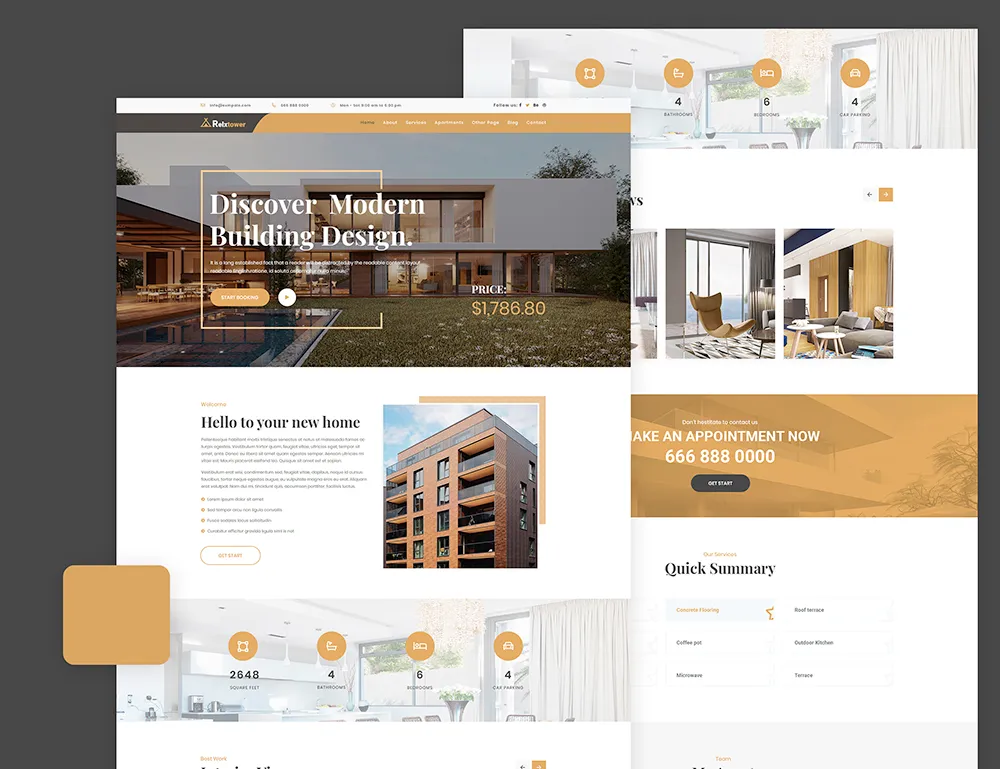

DEEPER
Custom Home Builder Websites:
Creating a Digital Presence for Home Builders

The Importance of Custom Home Builder Websites

Meeting the Needs of Home Builders
Custom home builder websites are tailored to the unique requirements of home builders. Unlike generic website templates, custom websites are designed to reflect the style, brand identity, and portfolio of a specific home-building company. They provide a platform for home builders to showcase their craftsmanship, share their completed projects, and connect with prospective clients.
Establishing Credibility and Trust
In the competitive world of home building, trust and credibility are paramount. A professionally designed website can convey a sense of reliability and expertise to potential clients. When visitors arrive at a well-crafted custom home builder website, they are more likely to trust the builder team's abilities and consider them for their dream home project.


Showcasing Past Projects
One of the most compelling features of custom homebuilder websites is the ability to display past projects. These websites typically include dedicated sections or pages that showcase completed construction jobs. By including high-quality images and detailed descriptions of these projects, home builders can effectively demonstrate their skills and capabilities.
Home Builder Websites We Have Built
A Thriving Market for Custom Homes
Australia is known for its diverse and dynamic real estate market. The state attracts homeowners looking for unique and custom-designed properties that reflect their lifestyles. As a result, the demand for custom homes is high, making it a lucrative market for home builders.


The Role of Home Builder Websites
Custom home builder websites play a pivotal role in Australia competitive home-building industry. They provide builders with a platform to reach potential clients, showcase their work, and stand out in a crowded market. Let's take a closer look at some examples of custom homebuilder websites in Australia.
Home Builder Website Examples

Highland Custom Homes

Align Builders

JDG Constructions

Liberty Homes
Building the Best Home Builder Websites
Website Design for Home Builders
The design of a custom homebuilder website is the first impression potential clients have of a builder's business. Therefore, it's crucial to invest in professional web design. Here are some key aspects to consider:

Consistent Design
High-Quality Images
User-Friendly Navigation
Mobile Responsiveness
Connecting with Customers
A successful custom homebuilder website should also include features that facilitate communication and engagement with potential clients. Here are some ways to achieve this:

Contact Information
Interactive Elements
Social Media Integration
Blog and Resources
The Business Impact of Custom Home Builder Websites
The creation of custom home builder websites is not merely a matter of aesthetics; it has a substantial impact on the builder's business. Let's explore how these websites contribute to the success of custom home designs and builders.

Attracting Clients
Showcasing Expertise
Streamlining Communication
Expanding Reach
Connecting with Clients Through Websites
Custom home builder websites are not static entities; they serve as dynamic platforms for engagement. Builders can take advantage of various features to connect with clients effectively.

Virtual Tours
Portfolio Updates
Blog and Resources
Contact Forms
The Role of Custom Home Builder Websites in Business Growth
Expanding Reach
A custom home builder website extends a builder's reach beyond their physical location. It allows potential clients from different geographic areas to discover their services. This expansion of the client base can lead to increased project opportunities and business growth.


Generating Leads
Websites can serve as lead-generation platforms. Through contact forms, inquiry submissions, and other interactive features, builders can collect valuable leads. These leads represent potential clients who have expressed interest in the builder's services.
Showcasing Unique Selling Points
Custom home builder websites provide a platform to highlight a builder's unique selling points. Whether it's a focus on sustainable construction, innovative design, or exceptional craftsmanship, the website can communicate these qualities to visitors.


Establishing Authority
A well-maintained blog or resources section on a website allows builders to establish themselves as authorities in their field. By sharing valuable insights and industry knowledge, builders can position themselves as experts, further attracting potential clients.
Building a Strong Brand
Custom home builder websites play a crucial role in brand building. They convey the builder's style, values, and commitment to quality. Consistent branding across the website helps reinforce the builder's identity in the minds of visitors.


Increasing Conversions
Ultimately, the primary goal of a custom homebuilder website is to convert visitors into clients. Effective website design, compelling content, and clear calls to action all contribute to higher conversion rates, leading to more projects and business growth.
The Future of Custom Home Builder Websites
Enhanced User Experience
Builders will continue prioritising user experience, ensuring their websites are intuitive, fast-loading, and mobile-responsive. Virtual reality (VR) and augmented reality (AR) technologies may also be integrated for immersive experiences.


Sustainability and Energy Efficiency
Builders will increasingly highlight their commitment to sustainability and energy efficiency on their websites. Information about green building practices, eco-friendly materials, and energy-saving technologies will be prominently featured.
Personalisation
Customization and personalization will become more prevalent. Builders may offer tools that allow visitors to customize floor plans, materials, and design elements of connect homes to suit their preferences.


Interactive Features
Interactive features such as 3D home tours, interactive floor plans, and online design consultations will become standard on builder websites. These features engage visitors and provide them with a more interactive experience.
Advanced Analytics
Builders will leverage advanced analytics to gain insights into visitor behavior and preferences. This data will inform website improvements and marketing strategies.


Continued Growth
Custom home builder websites will remain integral to the industry's growth. As more consumers turn to the internet to research and connect with builders, having a strong online presence will be essential for success.
Conclusion
Custom home builder websites are powerful tools for home builders to establish a credible online presence, showcase their work, and connect with potential clients. These websites serve as dynamic platforms for engagement, trust-building, and business growth. By investing in professional web design, incorporating social proof, and connecting effectively with clients, builders can harness the full potential of their online presence and thrive in the competitive world of home building. Whether in California or any other region, custom home-builder websites are the digital cornerstone of a successful home-building business.










